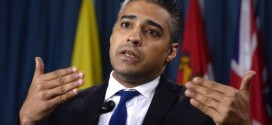The celebrated Canadian political philosopher Charles Taylor made headlines recently when he said that the prime minister's critical comments about Muslim women wearing the niqab (a partial face covering) were both "dumb" and a boon for terrorist recruiters such as the Islamic State. Taylor's point was that the prime minister is fuelling anti-Muslim sentiment and that in turn makes alienated Muslims in Canada more likely targets for terrorist recruiters. Taylor called the comments "a ridiculously disproportionate reaction" to the tiny number of women who wear the niqab in Canada. He speculated that some politicians are cynically trolling for votes by trying to sow division.
The news stories quoting Taylor arose largely from a scrum that he had with reporters following a keynote speech that he made to a gathering organized by the left-leaning Broadbent Institute, a think-tank named after the former NDP leader.
A public intellectual
Taylor, a professor emeritus of political philosophy at McGill University, is perhaps Canada's most prominent public intellectual. He was, for example, one of the main speakers early in March at an international conference in Rome convened by the Catholic Church's Pontifical Council for Culture. Taylor was also co-chair of the Bouchard-Taylor Commission in Quebec, which arose from a controversy stoked by some in Quebec against Muslims and other minority groups. The commission's report Building the Future was released in 2008 after months of testimony at public hearings.
Taylor's speech to the Broadbent Institute did target recent comments by some federal politicians, but at an earlier time he was also a blunt critic of plans by the Parti Quebecois to introduce a charter of values that would have forbidden people working in public institutions from wearing clothing or accessories of a religious nature.
Historical sweep
Taylor's speech was rich in its historical sweep, providing examples of how social exclusion has been practiced but also how it has been overcome. "We are in a race," he said, "between measures that create solidarity and those that create division. We must create bonds of solidarity and avoid stigmatization."
He used France as an example of a country that once had a positive attitude toward accepting immigrants, but that changed after Second World War and especially after the war in the former French colony of Algeria. "There is now a deep alienation among immigrants in France and the country is aggravating it with anti-Muslim measures."
Bonds of solidarity
Taylor asked his audience to think about how certain countries succeed in confronting the obstacles to welcoming newcomers while other nations do not. "If we allow people to get to know each other and if we create enough connections, we can get beyond this just as the Americans did with the Irish and the Polish," Taylor said. "We have to build connections of solidarity and to include those who are excluded."
All political leaders, Taylor said, have a responsibility to refrain from stigmatization. "It is really dangerous for the prime minister to say that Islam is anti-feminine because some women choose to wear the niqab. This creates confrontation and stigmatizes all Muslims and ultimately the bonds of solidarity may not be able to keep up with the amount of division. You can be desperate to win an election and think you can do that by creating tension, but if you succeed you may actually lose the country you want. We have to think in the long term."
Despite the controversies, Taylor said that he remains optimistic about the likelihood of having solidarity triumph over division in Canada. "We can meet this challenge. We have done so in the past in Canada and in Quebec and we can do so again."
Taylor said that all societies at one time or another attempt to exclude certain people and groups. There was once a strong opposition to Irish immigration into the United States, but Taylor said that the Americans overcame it. The symbolic end to that discrimination occurred when John Fitzgerald Kennedy became the country's president in 1960. "But today in the U.S. Hispanics are unwanted by a lot of Anglo-Saxon types," Taylor said, but he predicted that Americans will get beyond that exclusion as well.
 العربي الديمقراطي The Latest From The Arab World
العربي الديمقراطي The Latest From The Arab World






